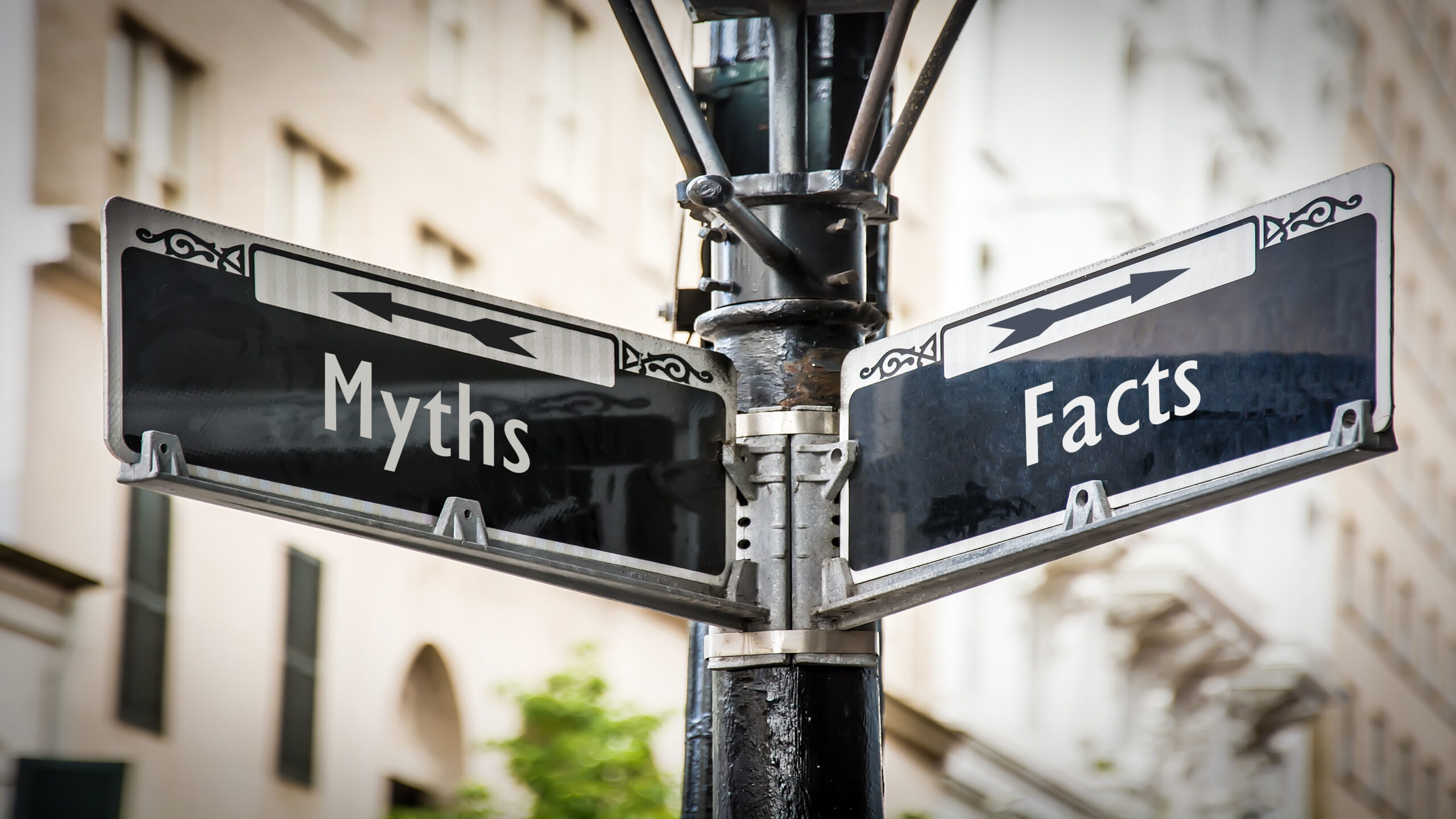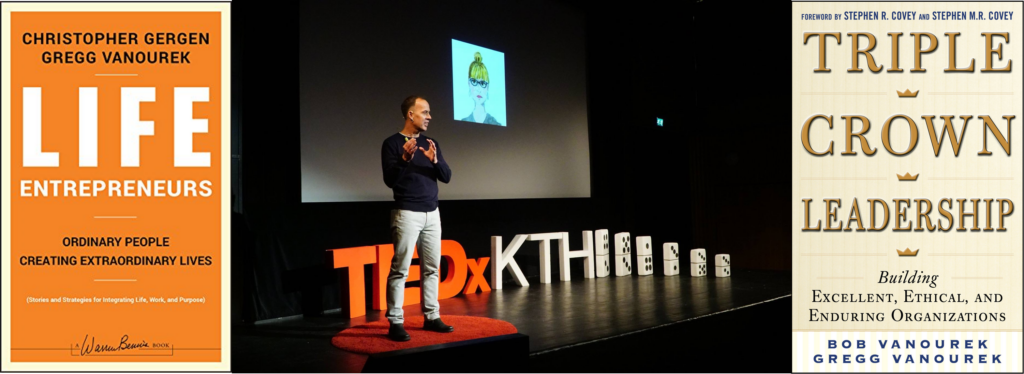Happiness is a universal aspiration. We all want happiness, including a sense of wellbeing and overall life satisfaction.
Here’s the problem: we’re bad at knowing what will actually bring us happiness.
There are many happiness myths that get in the way. Here are 14 of the most common happiness myths—and their corresponding realities.
Myth: Happiness is the goal of life—the be-all and end-all of human existence.
Many of us view happiness as the point of life.
Understandable. But flawed. Having happiness as our goal in life is destined to disappoint.
A better goal, I believe, is to live a good life, by becoming a good person. Leading a life of purpose, connection, and service. A life in which we learn, grow, and develop. Days of appreciation, joy, and savoring. A life of caring and action in the world to make things better, with others.
“The purpose of life is not to be happy. It is to be useful, to be honorable, to be compassionate,
to have it make some difference that you have lived and lived well.”
-Ralph Waldo Emerson, transcendentalist essayist, philosopher, and poet
Myth: We must pursue happiness. (And find it.)
The “pursuit of happiness” is pervasive. It’s even written into the U.S. Declaration of Independence, and it underlies much of our thinking about how to live.
Many of us are relentless pursuers of happiness. But pursuing it turns out to be counterproductive. Pursuing it won’t bring us the happiness we seek. And it’s not really something we find.
“Those only are happy who have their minds fixed on some object other than their own happiness: on the happiness of others, on the improvement of mankind, even on some art or pursuit followed not as a means, but as itself an ideal end.
Aiming at something else, they find happiness by the way.”
-John Stuart Mill, English philosopher and politician
Social psychologist Iris Mauss has shown that the more we strive for happiness, the more likely we are to feel disappointed, in part because we’ve set standards that are too high.
Happiness researcher Sonja Lyubomirsky prefers the phrases “creation of happiness” and “construction of happiness” to “pursuit of happiness.” She notes that we can create our own happiness.
Writer Chris Guillebeau flips the script from the “pursuit of happiness” to what he calls the “happiness of pursuit.” He says that the path to happiness involves pursuing a “quest,” a significant long-term goal or higher purpose.
Myth: Happiness comes from changing our circumstances.
The logic goes like this: “When I get X, then I’ll be happy.” When I get a…
new job
promotion
raise
new boss, house, spouse, or partner
more money
better body
fame
Here’s the problem: Happiness doesn’t come from external events or circumstances, at least in ways that endure. It’s an inside job.
“Happiness is not out there for us to find. The reason that it’s not out there is that it’s inside us…. Happiness, more than anything, is a state of mind, a way of perceiving and approaching ourselves and the world….”
-Sonja Lyubomirsky, researcher and professor
Why don’t we derive enduring happiness from positive circumstances? A big reason is a well-documented phenomenon called “hedonic adaptation,” in which we become rapidly accustomed to changes in our circumstances and then settle into that new baseline as if nothing had occurred.
“If you cannot be happy right now, in the present, no matter what your circumstances,
then you will never be happy ‘one day.’”
-Dannie De Novo, author
Myth: When I’m successful, I’ll be happy. (Corollary: Our happiness depends on what others think of us.)
The logic sounds reasonable: success leads to happiness. This belief is common, especially among high-performers and ambitious professionals whose identity is tied to their work and success.
But surprisingly, it works the other way around, according to the research: When we’re happy, we’re more likely to have success.
“When we are happy—when our mindset and mood are positive—we are smarter, more motivated, and thus more successful. Happiness is the center, and success revolves around it.”
-Shawn Achor, The Happiness Advantage

Myth: You either have happiness or you don’t.
The problem with this line of reasoning is that it gives away our agency.
Researchers have found that there are many contributors to happiness, including our genes, our circumstances, and our activities and practices.
Since some of these are out of our control, the key is to create our own happiness, as noted above, by engaging in happiness-promoting activities and in leading a good, full, and meaningful life.
“If you do the work, research shows you can become happier.”
-Sonja Lyubomirsky, researcher and professor
Myth: Having things will make us happy. (Corollary: Happiness comes from things outside of us.)
Does having things fill us up? Is accumulation and display of things likely to give us a sense of deep satisfaction and fulfillment that endures?
These are myths fabricated by certain types of advertisers looking to cash in on our vanity and insecurity.
“Society teaches us that having more will make you happy, and that having more is the measure of success. Having more increases your level of stress because of the amount of energy it takes to maintain things. A lot of times when people get more things, the more they are unhappy.”
-Dee Doanes, author and small business owner
The reality is that connecting with people—with deep, lasting relationships and a sense of belonging—is a much more powerful contributor to happiness and life satisfaction.
“Here’s the most fundamental finding of happiness economics: the factors that most determine our happiness are social, not material…. Social connectedness is the most important of all the variables which contribute to a sense of wellbeing in life. And that is true at any age.”
-Jonathan Rauch, The Happiness Curve
Caring for others can help us be happier and healthier, if we also engage in self-care and don’t overcommit, burn out, or care so much that we lose ourselves in the process.
Helping others is a source of deep and lasting happiness, well beyond collecting or accumulating things. According to Professor Stephen G. Post at Stony Brook University, “When people help others through formal volunteering or generous actions, about half report feeling a ‘helper’s high,’ and 13% even experience alleviation of aches and pains.”
“I don’t know what your destiny will be, but one thing I know:
the only ones among you who will be really happy are those who have sought and found how to serve.”
-Albert Schweitzer, humanitarian, philosopher, and physician
Together, these connections and contributions give us a sense of meaning and deep satisfaction.
Myth: Money will bring us happiness.
Many people live today as if the point of life was the accumulation of money. Wealth is conflated with success, making life a game in which the aim is to maximize wealth. Then we’ve won.
Not so fast.
A study of 12,000 first-year students at elite universities looked at their attitudes when they were eighteen years old and then measured their life satisfaction at age 37. The findings: those with materialistic aspirations at 18, with making money as their primary goal, were less satisfied with their lives two decades later.
Don’t get me wrong: There’s nothing wrong with money. It’s a powerful tool. A means to larger ends. But money alone doesn’t lead to the happiness promised land. Not by a longshot.
“Don’t let your happiness depend on something you may lose.”
-C.S. Lewis, British scholar, writer, and lay theologian
Myth: Happiness is a destination.
The idea here is that happiness is a place we’ll arrive at. A magical land where we can bask in rays of joy. If only we could all book tickets to that magical land….
Alas.
There’s no such place. Happiness is more of a mindset and way of life, with daily intentional activities, than a destination we arrive at.
“The foolish man seeks happiness in the distance. The wise grows it under his feet.”
-James Oppenheim, poet and novelist
Myth: Happiness is pleasure.
Let’s be clear. Pleasure is great. We should savor it. There’s nothing wrong with wanting a pleasant life and pleasurable experiences. But that alone won’t suffice.
In his book, Authentic Happiness, prominent psychologist Martin Seligman taught us that a full life includes not only the pleasant life but also a good life and a meaningful life.
“Many people have the wrong idea of what constitutes true happiness.
It is not attained through self-gratification, but through fidelity to a worthy purpose.”
-Helen Keller, writer and disability rights advocate
Myth: Happiness is mostly about how we feel.
When we think of happiness, we’re transported to the emotional realm. We think of pleasant feelings, and perhaps nostalgia-soaked memories of good times. Professor Barbara Fredrickson identified the ten most common positive emotions: joy, gratitude, serenity, interest, hope, pride, amusement, inspiration, awe, and love.
But it turns out that much of happiness, especially enduring happiness, comes from who and how we are, not just how we happen to be feeling.
Many ancient Greek philosophers wrote extensively about “eudaimonia.” It’s commonly translated as “happiness,” but what they meant by it goes well beyond what we think of as happiness today. They meant happiness through virtuous action, habits of moral excellence, and a full flourishing of self. It includes fulfillment of our nature.
Eudaimonia is about actions and habits, whereas the way we think about happiness today is about feelings and mental states. From this vantage point, a good life is something we should work toward every day, through our mindsets, actions, and relationships.
Myth: We always revert to our “happiness set point.”
There’s a common belief that we can’t do much about our happiness, so why try? “Happiness set-point theory” is the notion that our happiness level is determined primarily by our genes. The idea is that our happiness remains relatively constant throughout our lives, and we inevitably return to a fairly stable “happiness set point,” regardless of our circumstances. (This relates to “hedonic adaptation,” in which we rapidly accustom ourselves to changes in our circumstances and then settle into that new baseline.)
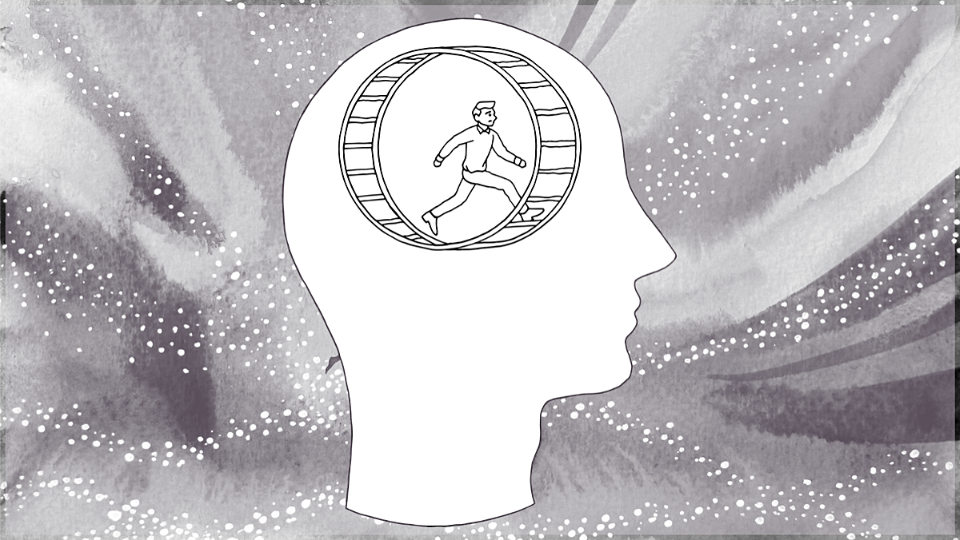
Researchers Sonja Lyubomirsky, Kennon Sheldon, and David Schkade developed the “sustainable happiness model,” which posits that we have more agency over our happiness levels than happiness set-point theory seems to suggest.
“…just because your happiness set point cannot be changed doesn’t mean that your happiness level cannot be changed….. Our genes do not determine our life experience and our behavior…. There’s a great deal of room to improve our happiness by the things we do, our intentional activities.” -Sonja Lyubomirsky, The How of Happiness
Myth: We can’t be happy when we’re facing negative events.
Some view happiness as a pleasant state free from pain or negative circumstances. Sounds reasonable. But a closer look reveals that happiness can sometimes depend on negative events—or the absence of positive ones.
“The deeper that sorrow carves into your being, the more joy you can contain.”
-Kahlil Gibran, Lebanese-American writer and poet
The truth is that difficulty, struggle, and loss are sometimes necessary on our path toward a life of greater fulfillment and worth.
In The Happiness Hypothesis, social psychologist Jonathan Haidt writes about the “adversity hypothesis”: the idea that people need adversity and setbacks to develop and rise to their potential.
Adversity can strengthen relationships and lead to feelings of love, connection, and gratitude for help provided. It can also cause us to revisit our priorities.
In the end, happiness isn’t about having positive experiences and circumstances and avoiding negative ones. Why cede our happiness to outside circumstances, many of which are out of our control?
“The most unhelpful myth out there is that the normal state for most humans is to be happy all the time. Those who are able to accept their pain as a part of life are much better equipped to handle it and move through it.” -Karly Hoffman King, mental health counselor
Myth: Happiness is a solo endeavor.
Sometimes the way we think about happiness is insular. Narcissistic even. Sometimes happiness is all about me, and how I feel, and how things are going for me.
Me, me, me.
But that misses the mark. For most people, the most important contributor to enduring happiness is the quality of our relationships, according to the research.
We can feel love or compassion when we connect with others. And we can derive a sense of meaning and belonging. We can give and receive support when we’re connected to others.
According to a 2020 Charles Schwab survey , Americans reported that relationships are the most important factor for their overall happiness. All told, 39% of respondents ranked relationships as the top driver of overall happiness, compared with 27% reporting health, 17% money, 14% lifestyle, and 3% career.
Myth: Happiness declines with age. (The best years of our life are over.)
There’s a pernicious but common belief out there that with age comes decline and misery. We slow down. Or lose our faculties. We become unhappy or even bitter.
Sometimes true, sure enough, but mostly a profound misconception about adult development that underestimates the tremendous growth and generativity that can accompany aging.
“aging is an extraordinary process whereby you become the person you always should have been.”
-David Bowie, legendary singer and songwriter
But biases against aging persist. According to a 2020 global report based on a survey of 83,034 people in 57 countries, “At least one in every two people included in this study had moderate or high ageist attitudes.”
The reality is that older people are generally happier and more satisfied with their lives.
Journalist Jonathan Rauch writes about the “happiness curve,” which shows that for most people happiness follows a U-shaped trajectory, starting high but dropping from youthful sentiment and optimism about life into a long, low slump in midlife, and then rising again in our fifties and continuing mostly on an upward slope from there.
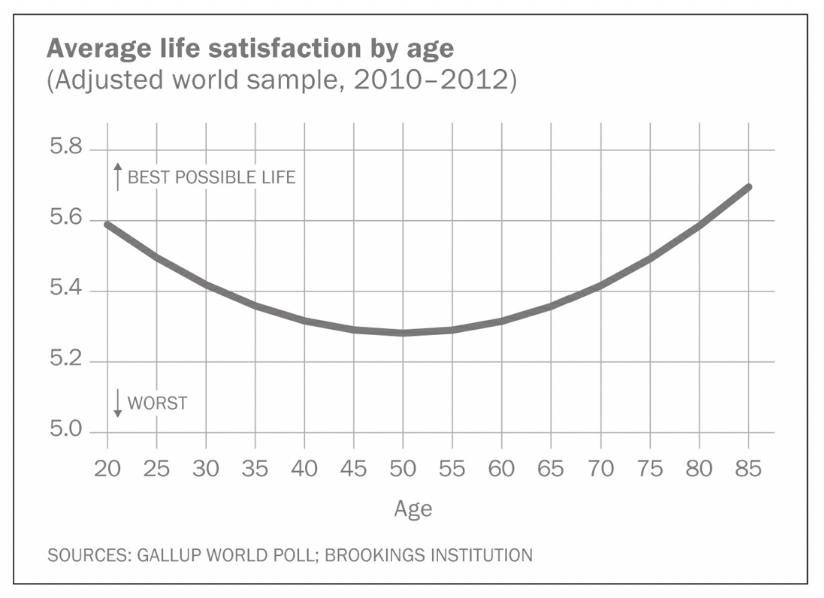
In his book, The Happiness Curve, Rauch writes about the “paradox of aging,” including the following:
- “Stress declines after about age fifty…
- Emotional regulation improves…
- Older people feel less regret…
- Older people are not depression-prone.”
Rauch also notes that aging tends to come with wisdom and tools for dealing with disappointment, anxiety, and depression based on lived experience.
It seems that part of this phenomenon may be that our values change as we age. In her book, A Long Bright Future: Happiness, Health, and Financial Security in an Age of Increased Longevity, Stanford Professor Laura Carstensen writes that old age “has its share of hardships and disappointments. It’s just that by the time people get there, they’re more attuned to the sweetness of life than to its bitterness.”
“Most people think that the older you get, the less happy you are. But the truth is, the older we get, the happier we are…. Women discuss how they will take more risks and get out there more. Men discuss how they calm down a little and are less stressed.” -Diane Lang, author and counselor
Rauch characterizes aging as “crossing toward wisdom,” including less ego-centric thinking and more orientation toward others.
Clearly, there are many myths about happiness. It’s long past time to debunk these myths and their accompanying mindsets and behaviors so we can lead our lives intentionally toward happiness, meaning, and fulfillment.
Recommended Books on Happiness
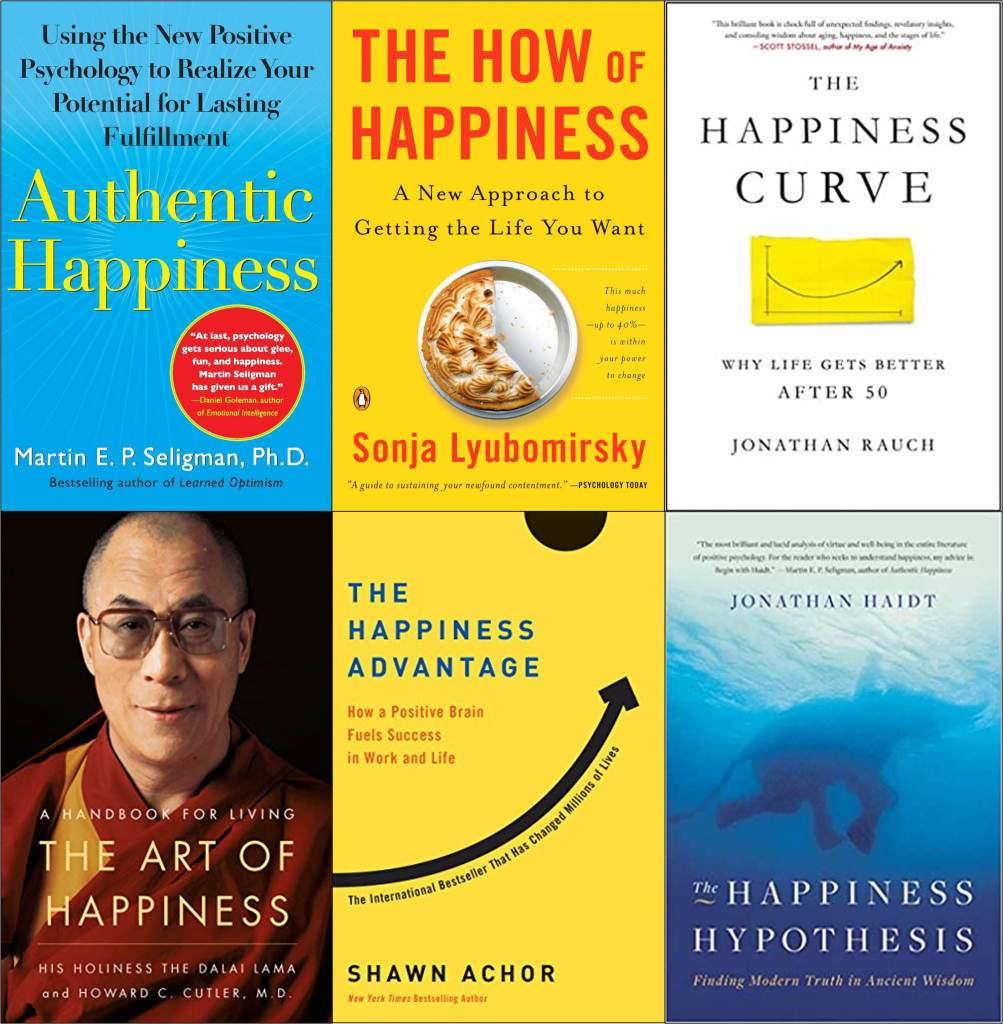
More Articles in this Happiness Series
- Why Happiness Is the Wrong Goal
- What Leads to Happiness
- The Most Important Contributor to Happiness
- The Surprising Relationship between Success and Happiness
- Why Is Happiness So Elusive?
Tools for You
- Traps Test (Common Traps of Living) to help you identify what’s getting in the way of your happiness and quality of life
- Quality of Life Assessment so you can discover your strongest areas and the areas that need work, then act accordingly.
- Personal Values Exercise to help you clarify what’s most important to you
Related Articles
Postscript: Quotations on Happiness
- “You must try to generate happiness within yourself. If you aren’t happy in one place, chances are you won’t be happy anyplace.” -Ernie Banks
- “It isn’t what you have or who you are or where you are or what you are doing that makes you happy or unhappy. It is what you think about it.” -Dale Carnegie
- “Happiness consists more in small conveniences or pleasures that occur every day, than in great pieces of good fortune that happen but seldom.” -Benjamin Franklin
- “The word ‘happiness’ would lose its meaning if it were not balanced by sadness.” -Carl Gustav Jung
- “There are times when you are going to do well, and times when you’re going to fail. But neither the doing well, nor the failure is the measure of success. The measure of success is what you think about what you’ve done. Let me put that another way: The way to be happy is to like yourself and the way to like yourself is to do only things that make you proud.” -Marc Lewis, professor of clinical psychology
- “Success is not the key to happiness. Happiness is the key to success. If you love what you are doing, you will be successful.” -Albert Schweitzer
- “Happiness does not depend on outward things but on the way we see them.” -Leo Tolstoy
- “Happiness cannot be traveled to, owned, earned, worn, or consumed. Happiness is the spiritual experience of living every minute with love, grace, and gratitude.” -Dennis Waitley
++++++++++++++++++++++++++++++
Gregg Vanourek is a writer, teacher, TEDx speaker, and coach on personal development and leadership. He is co-author of three books, including LIFE Entrepreneurs: Ordinary People Creating Extraordinary Lives (a manifesto for living with purpose and passion) and Triple Crown Leadership: Building Excellent, Ethical, and Enduring Organizations (a winner of the International Book Awards). Check out his Best Articles or get his monthly newsletter. If you found value in this article, please forward it to a friend. Every little bit helps!

